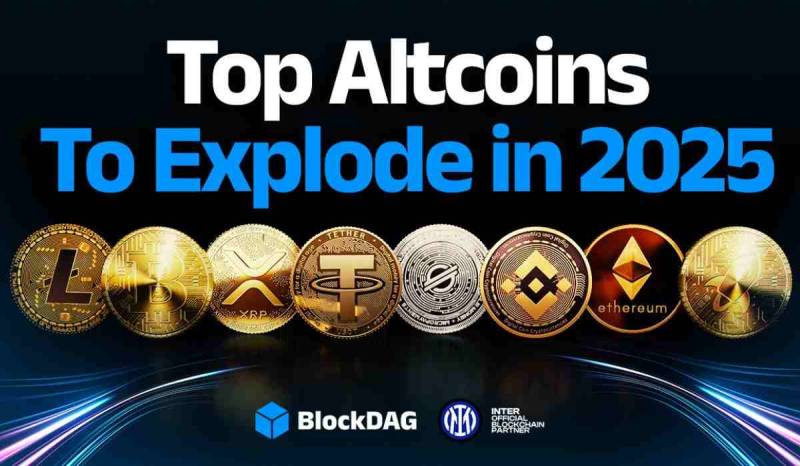 |
|
 |
|
 |
|
 |
|
 |
|
 |
|
 |
|
 |
|
 |
|
 |
|
 |
|
 |
|
 |
|
 |
|
 |
|
Cryptocurrency News Articles
OpenSea's NFT Dominance Fades Amidst Rising Competition
Apr 27, 2024 at 04:43 am
OpenSea, the former NFT marketplace leader, has lost significant market share to competitors such as Blur and Magic Eden. Despite a 92% decline in overall NFT trading volumes, OpenSea's weekly volumes have plummeted to $20 million, representing only 16% of the market. This loss of dominance is attributed to OpenSea's inability to adapt to changing market conditions, including new business tactics employed by rivals and the introduction of optional royalties, which has strained relationships with NFT creators.

OpenSea's Dominance Wanes Amidst Shifting NFT Marketplace Landscape
San Francisco, California - OpenSea, once the undisputed leader in the non-fungible token (NFT) marketplace, has witnessed a significant decline in its trading volumes, relinquishing its dominant position to emerging competitors Blur and Magic Eden. This shift marks a fundamental transformation in the NFT ecosystem, altering the business tactics and profit models that underpin these platforms.
Volume Erosion and Market Share Loss
At the height of its dominance nearly two years ago, OpenSea commanded a substantial 75% market share, with weekly trading volumes exceeding $1 billion. However, data from the Hildobby Dune dashboard reveals a stark decline, with OpenSea's volumes plummeting to a mere $20 million last week, accounting for approximately 16% of the total market. This sharp drop underscores the precipitous decline in overall NFT trading interest and activity since April 2022.
Competitive Market Dynamics
The emergence of Blur and Magic Eden has played a pivotal role in OpenSea's diminishing market share. Blur, with its zero trading fee model and its airdrop of governance tokens, quickly gained traction among NFT traders. Magic Eden, on the other hand, has captured a significant segment of the market by supporting NFT trading on multiple blockchains, including Bitcoin and Solana, in addition to Ethereum.
Strategic Missteps and Lost Relationships
Analysts attribute OpenSea's decline not only to external competition but also to internal strategic missteps. Eddie Wharton, a Web3 data science consultant and NFT trader, points to OpenSea's "first huge loss" to Blur due to its lack of competitive incentives and its controversial decision to make royalties optional, alienating many NFT creators.
Incentive Programs and Cross-Blockchain Support
Rival platforms like Blur and Magic Eden have effectively attracted and retained users through attractive incentive programs, such as points-based rewards and airdrops. Additionally, Magic Eden's support for various blockchains has provided it with a competitive advantage over OpenSea, which primarily focuses on Ethereum-based NFTs.
Brand Recognition and User Base
Despite its diminished market share, OpenSea maintains a strong brand reputation and a loyal user base. Per the Dune dashboard, OpenSea still boasts a higher number of daily and weekly active traders than its rivals, even though it lags behind in volume. This suggests that OpenSea's brand recognition continues to resonate with newcomers to the NFT market.
Seasoned Traders' Preferences
Seasoned NFT collectors and traders, however, have gravitated towards other platforms, according to Andrew Forte, head of strategy at Unfungible, a web3 consulting agency. This suggests that OpenSea may be losing its appeal to experienced NFT enthusiasts who seek specialized features and incentives offered by its competitors.
Conclusion
OpenSea's decline serves as a cautionary tale for dominant platforms in the rapidly evolving NFT landscape. Amidst intense competition and changing market dynamics, businesses must adapt their strategies and respond to emerging trends to maintain their market share and relevance. The rise of Blur and Magic Eden underscores the need for innovation, user incentives, and cross-platform compatibility in the ever-changing realm of non-fungible tokens.
Disclaimer:info@kdj.com
The information provided is not trading advice. kdj.com does not assume any responsibility for any investments made based on the information provided in this article. Cryptocurrencies are highly volatile and it is highly recommended that you invest with caution after thorough research!
If you believe that the content used on this website infringes your copyright, please contact us immediately (info@kdj.com) and we will delete it promptly.
-

- BlockDAG (BDAG) picks up speed, launching $30m grants program and partnering with SpaceDev to shape the next era of blockchain.
- Apr 11, 2025 at 10:10 am
- Learn what's shifting in Ethereum analysis, what's behind PI coin's fall, and how BlockDAG's SpaceDev deal and $30m grants shape the next era of blockchain.
-

-

-

-

-

-

- BlockDAG (BDAG), Litecoin (LTC), Filecoin (FIL), and Tron (TRX) Are Some of the Best Crypto Projects for 2025
- Apr 11, 2025 at 09:55 am
- Searching for the best crypto project for 2025 can be like hunting for treasures. While many initiatives appear and vanish, a select few exhibit remarkable durability.
-
![Bitcoin [BTC] Topped $88K After Trump's 'Less Severe' Tariff Plans Bitcoin [BTC] Topped $88K After Trump's 'Less Severe' Tariff Plans](/assets/pc/images/moren/280_160.png)
-

- BlockDAG (BDAG), StratoVM ($SVM), Solana (SOL), and Kaspa (KAS) Rank Among the Best Long-Term Cryptos to Buy the Dip
- Apr 11, 2025 at 09:50 am
- The market continues to shift, with popular coins seeing price drops due to recent global economic challenges. This has led many traders to shift focus to newer projects

















![🐢Super Mario World Koopa Troopa 100% 96⭐️ + Coin [Ao Vivo] 🐢Super Mario World Koopa Troopa 100% 96⭐️ + Coin [Ao Vivo]](/uploads/2025/04/10/cryptocurrencies-news/videos/super-mario-koopa-troopa-coin-ao-vivo/image-1.webp)









































![Bitcoin [BTC] Topped $88K After Trump's 'Less Severe' Tariff Plans Bitcoin [BTC] Topped $88K After Trump's 'Less Severe' Tariff Plans](/uploads/2025/03/26/cryptocurrencies-news/articles/bitcoin-btc-topped-k-trump-severe-tariff-plans/img-1_800_480.jpg)
